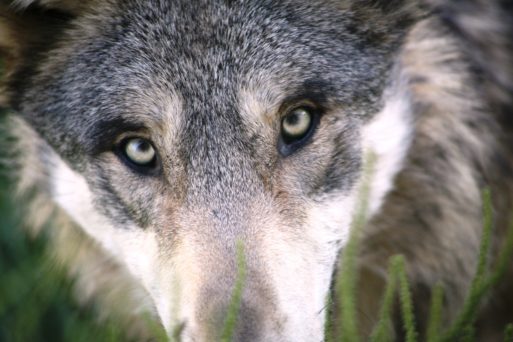
Credit: Brenda Timmermans
It was the week of asking. Asking
to watch her eat. Asking if she understood
the doctors’ questions. Asking her
to explain the difference between
wanting to die right now, and dying later.
The tumor making certain answers
unquestionable. I watched her point
to the incense dish from which
someone swept all the ashes up. Asking
if she recognized us. Because that
is what the living want: thinking
it is a sign we have been loved.
But the answer was a summer drive,
a mountain, piles of leaves beneath which
a wolf slept, suckling her cubs.
Some deaths are good
and it makes them hard to grieve.
In “The Wolves,” poet Paisley Rekdal explores the death of her 100-year-old grandmother, who had largely raised her as a child. It opens with a series of questions: the hard questions that individuals and families so often face when a loved one is dying. Then, somewhat surprisingly, the poem transitions into a vision of a mother wolf with her cubs.

Credit: paisleyrekdal.com
In an interview with Fogged Clarity, the poet explained this unusual choice. “One of the great tragedies was at the end of her life she had this brain tumor that just fried everything, you just never knew what was going to come out of her mouth,” Rekdal said. “She just started talking about these wolves that she’d seen on a mountain drive with her second husband and she just went on and on at length about seeing these wolves and then she fell asleep.” Rekdal was fascinated by the wolves, both as a surreal tangent and a metaphor for the maternal figure, weaving them throughout the poem.
As the daughter of a Chinese-American mother and a Norwegian father, Rekdal grew up in Washington state, where medical aid in dying is legal. MAID – death by lethal medication that is prescribed by a physician and self-administered – is now legal in 10 states and Washington, D.C., providing Rekdal’s grandmother with the opportunity to limit the pain and trauma involved. As Rekdal noted in “The Wolves”:
…She insisted upon it.
And why not. It was good for me
to get a chance to know you,
she said, who had known me
my entire life. Then the pills, a small
handful, crushed into juice.
She was happy then. We all were. Or
said we were. What
is the difference now.
In addition to the reduced pain of her death, Rekdal was comforted by the fact that her grandmother had returned to the positive memories from her past, however surreal or disjointed they might seem. “I can’t help but feel like there was something in her telling that story where she was trying to suggest that this was an idea about death that she might have, which is: at some point we’re just going to pass on, all we’re going to see is this scene, this beautiful scene that we can’t quite process, we can’t quite engage in” Rekdal said in the Fogged Clarity interview. “And it’s still a miracle to see it.”
You can read the full text of “The Wolves” on the Poetry Foundation’s website.

 “The Wolves,” by Paisley Rekdal
“The Wolves,” by Paisley Rekdal


 “Songbird” by Fleetwood Mac
“Songbird” by Fleetwood Mac
 First the Wealth Gap, Now the U.S. Has a Growing Health Gap
First the Wealth Gap, Now the U.S. Has a Growing Health Gap
 How to Comfort A Dying Loved One
How to Comfort A Dying Loved One














